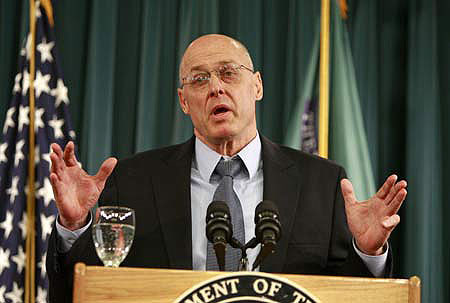|
 U.S. Treasury Secretary Henry Paulson speaks at a news conference at the Treasury Department in Washington, November 25, 2008. [Xinhua]
U.S. Treasury Secretary Henry Paulson speaks at a news conference at the Treasury Department in Washington, November 25, 2008. [Xinhua]
The U.S. government Tuesday unveiled a pair of new programs that will provide US$800 billion to help unfreeze the credit markets.
Under the Term Asset-Backed Securities Loan Facility, or TALF, the Federal Reserve Bank of New York will lend up to US$200 billion on a non-recourse basis to holders of newly issued AAA-rated ABS for a term of at least one year.
The Treasury Department will provide a US$20 billion of credit protection to the Federal Reserve in connection with the facility, using its authorities in the Emergency Economic Stabilization Act of 2008.
Moreover, the Federal Reserve will buy up to US$100 billion in direct obligations from mortgage giants Fannie Mae and Freddie Mac as well as the Federal Home Loan Banks. The Fed also will buy US$500 billion in mortgage-backed securities, pools of mortgages that are bundled together and sold to investors.
"This action is being taken to reduce the cost and increase the availability of credit for the purchase of houses, which in turn should support housing markets and foster improved conditions in financial markets more generally," said the Fed in a statement.
"As the economy is turning down, it is very important that lending be available to consumers," U.S. Treasury Secretary Henry Paulson said.
Meanwhile, data released on Tuesday showed the U.S. economy contracted in the July-September period by 0.5 percent, much deeper than first thought.
The update reading was weaker than the 0.3 percent rate of decline first estimated a month ago, and the worst showing since the world's largest economy shrank at a pace of 1.4 percent in the third quarter of 2001, when the nation was suffering through its last recession.
The classic definition of a recession is two consecutive quarters of negative GDP. Many economists believe the economy will continue to shrink in the fourth quarter and early next year.
(Xinhua News Agency November 26, 2008) | 